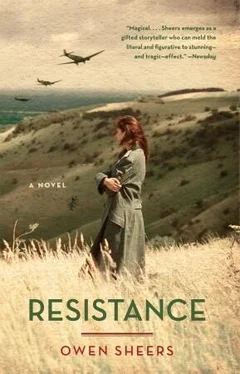“Sarah! Go get the next. An’ make sure you catch ’er proper, mind.”
Sarah understood what Maggie meant. Her arms were tired, hanging light as ribbons from her shoulders, and her fingers were cold and stiff. But when she caught the next ewe, she held it tightly, the wool coming through her fists like spurts of smoke between her knuckles. With one quick motion she swung it onto its rump. Maggie was already coming towards her, flexing the shears, the blades clean of rust along their edges where they’d slid against each other for years.
“Well done, bach,” Maggie said as she took the ewe from Sarah. “An’ again now.”
Sarah’s back ached, her left ear, which had slipped from under her scarf, tingled in the cold wind. Again she grabbed a sheep and swung it over with a grunt of effort. As she did she let her eyes flick up to the hedge at the edge of the field. They were gone. The two pale faces were no longer there, and once again Sarah found herself wondering if she’d seen them at all. Everything looked so ordinary. There was nothing left in their wake. No mark or sign to point towards their presence. Just the valley itself, as always, shedding and greying towards winter.
This is how it had been for all of them over the past few days. Chance glancings, a rush of the heart beneath the ribs. The soldiers glimpsed like apparitions in familiar places. Cruel echoes of their own missing husbands. And then they were gone, passed on, and everything looked as it always did once more.
None of the women had spoken to the Germans since that first evening when Albrecht conducted his tour of the valley’s farms. None of them except Maggie. Sarah had stayed at hers that night. She’d arrived out of the moonlit yard, Tom’s shotgun held unbroken in her hands. She was shaken, pale, confused. Calming her had calmed Maggie herself, and when she woke the next morning she’d known what she must do. Having seen Sarah back off to Upper Blaen, she set out herself for The Court, her old bitch collie trotting along the lane beside her. As she approached the solid old farmhouse, she became aware of the barrel of Gernot’s rifle tracing her as she made her way up the lane. He held it at his shoulder, his head bent to its sights, one eye closed in aim. As she got nearer he called over his shoulder into the house and Alex appeared from the front door behind him, a submachine gun held at his waist, his finger shadowing the trigger.
Maggie stood in front of the two soldiers where she’d stood talking to Reg and the boys a thousand times before and asked to speak to Captain Wolfram. Alex looked down at her, frowning heavily and understanding nothing until he heard Albrecht’s name, strangely flat in this old woman’s mouth. He went back inside for a moment then appeared at the door again with Albrecht at his shoulder. He was in his shirtsleeves and braces, wiping the last flecks of shaving soap from his face with a towel.
“Please, Mrs. Jones,” he said, pulling the towel over his hands. “Come inside.”
Maggie hesitated, surprised again by his refined accent. She was unsure whether she should cross this old-new threshold of The Court’s front porch, but something in the way the two other soldiers parted for her, like a set of double doors opening to a secret password, seemed to leave her no choice. Telling the dog to “cwtch ci,” she followed Albrecht inside.
She did not sit down. Albrecht and she spoke standing on the flagstones in the front room instead, like two battlefield generals meeting at dawn to negotiate the day’s engagement. The room smelt of solidified fat and old fire, cold ashes shifting under the grate in the breeze from the opened door.
Maggie made herself clear. They would not give the Germans anything. Food, supplies of any kind. The government had forbidden it and she wanted Captain Wolfram to know this now, to avoid any confusion. She would make sure that everyone in the valley stayed away from The Court while the soldiers were here. In return she wanted the captain’s assurance again that he and his men would leave them undisturbed and allow them to get on with their work of running the farms.
Albrecht nodded politely throughout Maggie’s speech, shivering a last drop of foam still suspended behind the lobe of his left ear. When she’d finished he told her he agreed with everything she had said. He appreciated her coming and he understood her position. He and his men had plenty of supplies, both of their own and now from the larder and vegetable garden of The Court. “I would, however, like to remind you, Mrs. Jones,” he said with a tight smile, “that whether your government forbids your cooperation or not is entirely irrelevant. This valley is, after all, like all of this area, under German military control.”
Maggie stiffened before him.
“But that is no matter,” he continued. “You will not be disturbed. I assure you.” He paused, looking her straight in the eye. “In any way.”
Albrecht gave Maggie a short bow. “Now, if you’ll excuse me we too must get on with our work.” He nodded to Alex, who opened the front door and guided Maggie back out onto the lane that ran beside The Court. The old woman walked beside him, two of her strides to one of his, her head level with the scratched buttons on the chest of his tunic. When he stopped, Maggie carried on without a pause, consciously keeping her back straight, her head high. Only when she’d rounded the bend in the lane and was out of sight of Gernot’s trailing rifle did she let her age fall in upon her once more, rounding her shoulders, shortening her stride, and bringing her hand instinctively to the base of her spine to cradle the pain that never left there. As she walked back to her farm, the old collie ran ahead of her, unaware anything had changed other than the arrival of a man scent back into the valley.
The German officer had said nothing about their husbands. She’d given him his chance. Because that’s why she’d really gone to The Court. To invite it, to bring it to a head. Then she might have been able to negotiate. To explain. Or (and is this what she’d really wanted?) the captain would have told her, simply, that he knew exactly where their husbands were. That they’d been captured, weeks ago. That he’d seen them himself, that they were prisoners of war. Maybe even (and at this thought Maggie felt something fall away from behind her eyes, a loosening of her skull) that they were dead. Yes, even that. That is why she’d gone to The Court. To know.
But the captain had said nothing and, in the end, neither had she. The men had been as absent from their conversation as they were from the valley. But the captain knew. She was sure of it. He knew.
On Albrecht’s part he was content with everything Maggie had said to him. This was how he wanted to keep things here. Simple and apart. After so many years and months of movement, after so many days of noise and fear and fighting, he wanted to give himself and his men a rest. So there was no need to impose his authority on these women. Especially with their husbands gone. To do so would just invite retaliation. No, better to have the lightest of touches upon this valley. Complete his work here and relish its silences, its pause in the world while he did. Let the women alone and let their husbands do their killing and being killed elsewhere.
It was never going to be easy for Albrecht to persuade the rest of the patrol to share this approach. They were, after all, young men as well as soldiers, and apart from some distant visits to a French brothel, they’d all spent months beyond the orbit of women. So Albrecht wasn’t entirely surprised when one evening a week after Maggie’s morning visit he’d had to remind them all again that there would be no interfering with these farm women, in any way.
Читать дальше












